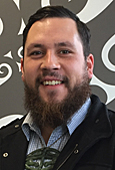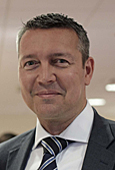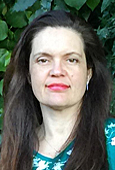 Hinerangi Barr holds a degree in Broadcasting Communications and has more than 25 years’ experience in media and the communications industry. She has worked in radio, television, print, social media and on communication campaigns. In 2006, she established a company, Te Āiorangi Ltd, to provide communication services and advice from a Māori perspective.
Hinerangi Barr holds a degree in Broadcasting Communications and has more than 25 years’ experience in media and the communications industry. She has worked in radio, television, print, social media and on communication campaigns. In 2006, she established a company, Te Āiorangi Ltd, to provide communication services and advice from a Māori perspective.
For the last two years, she has provided communications support to the Minister for Māori Development Minister and the Māori Party which is the only indigenous political party in Parliament.
Hinerangi is a strong advocate of Māori language and has raised all her children in a Māori-speaking household and through Māori-medium education. She is currently studying at the Institute of Excellence in the Māori Language – Te Panekiretanga o Te Reo.
She has been actively involved in a range of political and cultural issues for her sub-tribe Kāti Māhaki and Ngāi Tahu including the management of pounamu (jade). Hinerangi believes indigenous story-telling and tailored communications are vital tools of Māori development.
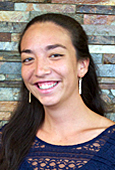 Aloha mai kākou! My name is Kapua Lililehua Chandler. I am the youngest and only daughter of Hilary Ferris and Kirkland Chandler; sister to Kuhio, Kai, and Kaleo Chandler. My maternal roots stretch back to the ʻāina of Oregon and California, while my paternal side is rooted in Wainiha, Hāʻena, and Kalalau valley on the island of Kauaʻi. Born on the island of Kauaʻi and raised in the moku of Haleleʻa, the cultural practices of fishing, hunting, and farming were steadily ingrained into my daily routine. With a strong foundation in cultural practices, I left at the young age of eleven years old to board and attend Kamehameha Schools Kapālama campus on the island of Oʻahu.
Aloha mai kākou! My name is Kapua Lililehua Chandler. I am the youngest and only daughter of Hilary Ferris and Kirkland Chandler; sister to Kuhio, Kai, and Kaleo Chandler. My maternal roots stretch back to the ʻāina of Oregon and California, while my paternal side is rooted in Wainiha, Hāʻena, and Kalalau valley on the island of Kauaʻi. Born on the island of Kauaʻi and raised in the moku of Haleleʻa, the cultural practices of fishing, hunting, and farming were steadily ingrained into my daily routine. With a strong foundation in cultural practices, I left at the young age of eleven years old to board and attend Kamehameha Schools Kapālama campus on the island of Oʻahu.
As the first in a long line of descendants from my Grandmother, Elizabeth “Kapeka” Mahuiki Chandler, to attend Kamehameha Schools, I have since continued my educational journey without falter. Upon graduating from Kamehameha Schools in 2008, I received a Bachelors of Science degree in Computer Science with a second major in Mathematics in 2012 from the University of Portland in Oregon. I returned to Hawaiʻi and in 2014 received a Master’s of Education in Educational Administration with a focus in Higher Education from the University of Hawaiʻi at Mānoa. I am now pursuing my Doctoral degree at the University of California Los Angeles in Higher Education and Organizational Change.
As my education has taken me to the lands of my ancestors, both maternal and paternal, my commitment to my Haleleʻa, Kauaʻi community remains steadfast. In the realm of education, my research agenda has focused on issues of access and retention in higher education for Native Hawaiian students. While not in the classroom, each break and summer I return home to work our family farm, hunt with my brother, fish with my father, and make lei with my mother. I have worked summers with the Waipā Foundation ʻohana as a Kumu, teaching our keiki about our ʻāina through moʻolelo, hana, and ʻike. When I return home, I stay active through paddling for Hanalei Canoe Club (founded by my Grandparents). It is through reconnecting with my ʻohana, in its various forms, I am kept grounded in my culture, thereby grounded in my values, and continuously motivated to improving our higher education system for our Native Hawaiian youth.
As one of the few self-identified country Hawaiian women in higher education, I have come to understand the ways in which higher education is an unwelcoming place for many of our Native Hawaiian youth. My goal is to re-vision the way we think of higher education beyond the Western standard and re-develop spaces with the specific intent to serve Native Hawaiian peoples. Furthermore, I aim to work with and learn from other Indigenous peoples to improve our higher education system in Hawaiʻi. I envision a higher education where Hawaiian culture and practice are embraced and rooted in every degree granted whether in science, engineering, art, or language. As an Indigenous educator and cultural practitioner, I am excited to be a part of this year’s First Nations’ Futures Program hui and look forward to learning and growing through fellowship with my peers. Mahalo piha.
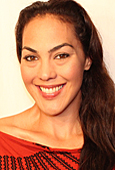 Aloha mai. My name is ʻĀnela Marie Kawehikulaonālani Evans. I was raised, from birth, in Lānaʻi City, in the ahupuaʻa of Kamoku, on the island of Lānaʻi. My parents are Martha Haia Evans and the late Andrew Evans. I am of Hawaiian, Portuguese, Greek, Welsh, and Chinese ancestry. I graduated from The Kamehameha Schools Kapālama Campus in 2003. I then attended the University of Hawaiʻi at Mānoa, where I earned Bachelor of Arts in 2007 and Master of Arts Degrees in 2011, both in Hawaiian Studies as well as completed comprehensive studies in ʻŌlelo Hawaiʻi and Ethnic Studies.
Aloha mai. My name is ʻĀnela Marie Kawehikulaonālani Evans. I was raised, from birth, in Lānaʻi City, in the ahupuaʻa of Kamoku, on the island of Lānaʻi. My parents are Martha Haia Evans and the late Andrew Evans. I am of Hawaiian, Portuguese, Greek, Welsh, and Chinese ancestry. I graduated from The Kamehameha Schools Kapālama Campus in 2003. I then attended the University of Hawaiʻi at Mānoa, where I earned Bachelor of Arts in 2007 and Master of Arts Degrees in 2011, both in Hawaiian Studies as well as completed comprehensive studies in ʻŌlelo Hawaiʻi and Ethnic Studies.
At the age of four, I began formal hula training under Kumu Hula Rita Moon of Nā Pua Lei O Ke Kaunaʻoa. In 2003, after graduating from high school, I began dancing with Ka Pā Hula O Kauanoe O Waʻahila under the direction of Kumu Hula Maelia Lobenstein Carter. During my hula career, both hālau stressed the value that “Hula is Life,” and that the practice of hula is all encompassing of all of the cultural traditions that accompany the dance, such as lei making, oli and cultural protocol. Hula has presented amazing opportunities to me, such as the chance to travel and participate in cultural exchanges in Japan and Aotearoa, as well as numerous opportunities to participate with my hālau in the prestigious Merrie Monarch Festival.
While studying at UH Mānoa, I became involved in the Protect Kahoʻolawe ʻOhana, where I’ve volunteered as a facilitator, planner, and coordinator of huakaʻi to Kahoʻolawe, as well as coordinated educational events and fundraisers for the ʻOhana for over 10 years. Eventually, my volunteer experience on Kahoʻolawe led to the opportunity to work for the Kahoʻolawe Island Reserve Commission, where I served as the Coordinator for Volunteer Access to Kahoʻolawe for two years.
Lānaʻi, however, has always been where my heart is, and in 2015, I was blessed with the opportunity to return home and pursue my career goals with Pūlama Lānaʻi, where I currently serve as an Assistant Manager in the Culture and Historic Preservation Division. Through my capacity at Pūlama Lānaʻi, I am able to work with the community and visitors to engage in stewardship of Lānaʻi’s cultural and natural resources as well as present educational opportunities to various groups. Currently, our division is hard at work restoring one of Lānaʻi’s five loko iʻa as well as caring for ancient loʻi in Maunalei Valley, where Lānaʻi’s only perennial stream once flowed.
Lānaʻi means the world to me. I was raised in a time and place where the Hawaiian practice of extended ʻohana was still prominent. Everyone helped everyone and I was taught that caring for others and the community is extremely important. Both of my parents worked full-time – my mother as sixth grade teacher, and my father as the sole Lānaʻi employee for the phone company. My parents were integral members of the Lānaʻi community and often put the needs of others first. My mom spearheaded the fight against Lānaʻi Company in the late 1980s. She often tells of how I spent my second birthday at a contested case hearing of the Land Use Commission, the major issues being community access to the land and ocean, water use, and preservation of cultural and natural resources. These are the values that I strive to live every day and I have made it my mission in life to give back to Lānaʻi.
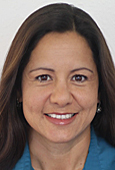 Makana Kaha`ulelio is from Kāne`ohe, O`ahu and currently resides in Ka`a`awa. She attended Kamehameha Schools and upon graduating, went straight into the workforce where she found a passion for the field of education. To strengthen her abilities as a teacher, Makana returned to school as a non-traditional student and earned a BA in Interdisciplinary Studies; Childhood Education.
Makana Kaha`ulelio is from Kāne`ohe, O`ahu and currently resides in Ka`a`awa. She attended Kamehameha Schools and upon graduating, went straight into the workforce where she found a passion for the field of education. To strengthen her abilities as a teacher, Makana returned to school as a non-traditional student and earned a BA in Interdisciplinary Studies; Childhood Education.
As a child, Makana spent much of her time exploring the beaches, mountains and streams of Ko`olaupoko, which instilled in her a strong connection to the natural environment. As a teacher, she witnessed the benefit of outdoor experiences for students’ social, emotional and academic growth. With this foundation, Makana’s mission is to cultivate future leaders of Hawai`i who are committed to caring for our `āina.
To best focus on her mission, Makana started her own business to support and serve schools and youth organizations through customized programs developing leadership skills, team engagement, and environmental literacy. Makana also serves as the Hawai`i State Coordinator for Project Learning Tree, a national award-winning environmental education curriculum.
Makana is a forever-student, open to new ideas and thirsty to learn. She is humbled and honored to be chosen as a First Nations’ Futures fellow and looks forward to representing and serving her community through this experience.
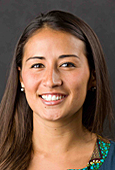 Aloha mai! ʻO Shaelene Kuʻulei Kamakaʻala koʻu inoa. Born and raised in the ahupuaʻa of Punaluʻu, Koʻolau Loa, Oʻahu, I later moved to and currently reside in Kahana, the neighboring ahupuaʻa, where my ʻohana trace our roots back at least three generations. Growing up as a fisherman’s daughter, my earliest memories are filled with rich experiences of walking our shorelines, climbing mountains to kilo iʻa, and practically always being on the boat. My love for the ocean and all its life traces back through my subconscious memories to my kūpuna who passed such values and memories down…simple things like sharing one’s catch and only taking what you need…values that continue to live through my father and ʻohana today. Yet, through all of this beauty, at a time where rising oceans, climate change, and the rapid degradation of our natural and bio-cultural resources pose serious and real threats to our ability to engage in our cultural practices, I am inspired to live a life and career that will help provide systemic solutions for Hawaiʻi and the world.
Aloha mai! ʻO Shaelene Kuʻulei Kamakaʻala koʻu inoa. Born and raised in the ahupuaʻa of Punaluʻu, Koʻolau Loa, Oʻahu, I later moved to and currently reside in Kahana, the neighboring ahupuaʻa, where my ʻohana trace our roots back at least three generations. Growing up as a fisherman’s daughter, my earliest memories are filled with rich experiences of walking our shorelines, climbing mountains to kilo iʻa, and practically always being on the boat. My love for the ocean and all its life traces back through my subconscious memories to my kūpuna who passed such values and memories down…simple things like sharing one’s catch and only taking what you need…values that continue to live through my father and ʻohana today. Yet, through all of this beauty, at a time where rising oceans, climate change, and the rapid degradation of our natural and bio-cultural resources pose serious and real threats to our ability to engage in our cultural practices, I am inspired to live a life and career that will help provide systemic solutions for Hawaiʻi and the world.
Graduating from the Kamehameha Schools in 2005 (I mua!), I completed my Associate’s of Art Degree in Political Science from Marymount College, Palos Verdes, California in 2007, my Bachelor’s Degree in Political Science from the University of San Diego in 2009, and most recently, my Juris Doctor Degree from the William S. Richardson School of Law in 2014.
I am rooted and active in my community as the joint-co-founder of the Kahana Kilo Kai program, a grassroots and community-based ocean monitoring program (a program housed within the non-profit organization Hoʻāla ʻĀina Kūpono, in which I am also a board member of). Kahana Kilo Kai’s vision is to build the community’s capacity to restore Kahana’s konohiki fishery and bring abundance back to the bay. I also represent Oʻahu as a member of the E Alu Pū Council, a network of grassroots communities caring for their place. Since graduating from law school, I have had the privilege of working with and learning from communities statewide, while championing community-based stewardship of Hawaiʻi’s nearshore fisheries. I learned that it’s the families who depend on the resources for subsistence and cultural practices that hold knowledge about nature’s cycles and social dynamics, providing real-time solutions to better steward Hawaiʻi’s natural and bio cultural resources.
Over the past year, I worked with the Hui ʻĀina Momona Program at the University of Hawaiʻi at Mānoa to develop a cross-disciplinary graduate and professional level certificate program in culturally grounded resource management. I was also afforded the opportunity to kōkua the Moʻomomi and Hoʻolehua Homestead community as we updated and submitted its Moʻomomi North Coast of Molokaʻi Community Based Subsistence Fishing Area Proposal and Management Plan to the Dept. of Land and Natural Resources, Division of Aquatic Resources. With watershed management planning experience working with the Manaʻe, Molokaʻi community, the Office of Hawaiian Affairs, The Nature Conservancy, and other stakeholders, I have recently joined Townscape, Inc. staff to develop a watershed management plan for urban Honolulu.
As our Lāhui continues to engage in discussions about sovereignty, a wise kūpuna once shared that sovereignty is the ability of our people to feed and sustain themselves. I am excited and honored to serve as a 2016-2017 FNFP Fellow and am looking forward to building skillsets and experiences to provide innovative and systemic solutions that will support our community’s return to mālama ʻāina.
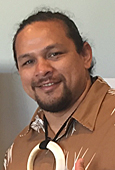 Anoʻai me ke aloha e nā hoa makamaka o Ko Hawaiʻi Pae ʻĀina. ʻO Lāiana Kanoa-Wong koʻu inoa. He kama au na Laiana Wong lāua ʻo Lilinoe Kealoha Wong. I was raised in the adjoining ahupuaʻa of Kapālama and Kalihi, Kona, Oʻahu but currently reside in Kahaluʻu, Koʻolaupoko, Oʻahu. I am a proud graduate of the kula kaiapuni Hawaiian immersion system, beginning at Pūnana Leo o Honolulu, continuing at Ke Kula Kaiapuni ʻo Waiau and eventually Ke Kula Kaiapuni ʻo Ānuenue where I graduated as valedictorian in 2002. I graduated with my B.A. in ʻŌlelo Hawaiʻi and my Masters of Education, both from the University of Hawaiʻi at Mānoa. Like my parents before me, my background is in Hawaiian education. I began my career teaching at my former schools; Pūnana Leo, Ke Kula Kaiapuni ʻo Ānuenue, as well as Hālau Kū Māna New Century Public Charter School. I’ve also taught many intersession programs through Nā Pua Noʻeau as well as Kamehameha Schools Extension Education Programs, and always through a lens of aloha ‘āina and hoʻōla lāhui. In 2013, I was welcomed into the Hoʻokahua ʻohana at Kamehameha Schools where my duties include helping to revitalize our language and culture organization-wide for haumāna and Kamehameha Schools staff on every island.
Anoʻai me ke aloha e nā hoa makamaka o Ko Hawaiʻi Pae ʻĀina. ʻO Lāiana Kanoa-Wong koʻu inoa. He kama au na Laiana Wong lāua ʻo Lilinoe Kealoha Wong. I was raised in the adjoining ahupuaʻa of Kapālama and Kalihi, Kona, Oʻahu but currently reside in Kahaluʻu, Koʻolaupoko, Oʻahu. I am a proud graduate of the kula kaiapuni Hawaiian immersion system, beginning at Pūnana Leo o Honolulu, continuing at Ke Kula Kaiapuni ʻo Waiau and eventually Ke Kula Kaiapuni ʻo Ānuenue where I graduated as valedictorian in 2002. I graduated with my B.A. in ʻŌlelo Hawaiʻi and my Masters of Education, both from the University of Hawaiʻi at Mānoa. Like my parents before me, my background is in Hawaiian education. I began my career teaching at my former schools; Pūnana Leo, Ke Kula Kaiapuni ʻo Ānuenue, as well as Hālau Kū Māna New Century Public Charter School. I’ve also taught many intersession programs through Nā Pua Noʻeau as well as Kamehameha Schools Extension Education Programs, and always through a lens of aloha ‘āina and hoʻōla lāhui. In 2013, I was welcomed into the Hoʻokahua ʻohana at Kamehameha Schools where my duties include helping to revitalize our language and culture organization-wide for haumāna and Kamehameha Schools staff on every island.
As a proud parent of three keiki kaiapuni, I enjoy staying active with the parent organizations for Ke Kula Kaiapuni ‘o Samuel M. Kamakau and Pūnana Leo o Mānoa as well as being a parent representative of the ʻAha Kauleo, the kaiapuni advisory board to the DOE superintendent. My community involvement has included being an Access Guide and longtime Kua-In-Training for the Protect Kahoʻolawe ʻOhana as well as helping out at many loʻi kalo and loko iʻa around our pae ‘āina. I am very humbled and grateful for this amazing opportunity to learn and grow in the First Nations’ Futures Program. I believe that through ʻōlelo Hawaiʻi and aloha ‘āina, we can help educate the next generations of kānaka maoli to be exemplary stewards of our culture, ‘āina and lāhui.
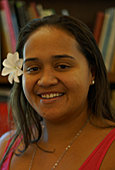 Aloha mai, o au ‘o Sanoe Marfil. Ua hānai a hānau au ma ka mokupuni o O‘ahu a kēia manawa noho au ma ka ‘āina pulapula ma Nānākuli me ku‘u ‘ohana.
Aloha mai, o au ‘o Sanoe Marfil. Ua hānai a hānau au ma ka mokupuni o O‘ahu a kēia manawa noho au ma ka ‘āina pulapula ma Nānākuli me ku‘u ‘ohana.
As a proud graduate of Nānākuli High School, I continued my education at the University of Hawaii at Mānoa and earned a B.A. in Humanities with a focus in Hawaiian Pacific Studies. Currently, I am a student at Kamakakūokalani pursing a Masters degree in Hawaiian Culture with a focus in ‘āina and mo‘olelo.
For the past 10 years I have worked at the Institute for Native Pacific Education and Culture (INPEACE). I spend my time focused on my personal passion for Hawaiian culture by designing and creating curriculum and activities to instill knowledge, appreciation and skills in the Hawaiian culture for professionals, families and individuals of all ages.
I am humbled and honored for this opportunity and I believe that it will help drive my commitment and passion to my community of Nānākuli.
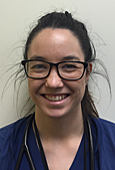 Tena Koutau katoa. I te taha o toku mama ko Maungatere te maunga, ko Rakahuriri te awa, ko Ngai Tuahuriri te hapu. I te taha o toku papa ko Waimango te marae, ko Te Whanau o Haunui toku hapu. Ko Ngai Tahu raua ko Ngati Raukawa oku iwi. Ko Hana Huria Royal ahau.
Tena Koutau katoa. I te taha o toku mama ko Maungatere te maunga, ko Rakahuriri te awa, ko Ngai Tuahuriri te hapu. I te taha o toku papa ko Waimango te marae, ko Te Whanau o Haunui toku hapu. Ko Ngai Tahu raua ko Ngati Raukawa oku iwi. Ko Hana Huria Royal ahau.
Tena koutou katoa my name is Hana Royal and I am 25 years old. I grew up on my pa at Tuahiwi in North Canterbury.
Following graduation of high school, I attended University of Auckland Medical School. In 2014, I graduated with a bachelor of Medicine and Surgery.
My ultimate career goal is to become a General Surgeon specialising in breast surgery. My aspiration is to eliminate non genetic breast cancer within Maori, one woman at a time.
I am grateful for the opportunity to participate in FNFP and to advance our shared first nations aspirations.
Kai aku nui, kai aku rahi, nāia te mihi.
I have iwi affiliations to Ngāi Tahu, Ngāti Awa and Te Whānau-a-Apanui.
I am a graduate of the University of Canterbury where I completed a Bachelor of Arts Hons in Te Reo Māori (language) and Māori and Indigenous Studies. In my final year, I took on a tutoring role before being appointed as an Assistant Lecturer at Aotahi: School of Māori and Indigenous Studies.
As a second language learner, I have been heavily involved in Ngāi Tahu’s language revitalisation programme, Kotahi Mano Kāika (KMK), as a learner, teacher and employee. KMK seeks to have 1000 Ngāi Tahu homes speaking Te Reo Māori by 2025.
I currently work as a Mana Whenua Education Facilitator, working with schools to incorporate and embed the cultural narratives of local rūnanga (tribal councils) into curriculum and everyday teaching practice.
Outside of work, I am an avid kapa haka (Māori performing arts) performer, tutor and composer. In 2013, I co-founded a kapa haka group, Te Pao a Tahu, a group dedicated to preserving Ngāi Tahu stories and traditions. I am also actively involved in rūnanga affairs at Tuahiwi Marae, home of my primary hapū (sub-tribe) Ngāi Tūāhuriri.
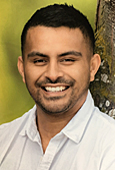 Tēnā tātou katoa. Ko Henare Te Aika-Puanaki tōku ingoa. He uri tēnei o Ngāi Tahu, Ngāti Kahungunu, Ngāi Tāmanuhiri, Ngāti Awa me Te Whānau-a-Apanui. My name is Henare and I am currently working in total immersion education at Te Kura Kaupapa Māori o Te Whānau Tahi in Christchurch, New Zealand, teaching at secondary level. I live with my partner Rhea and we have a young boy, Te Maiaorere. I affiliate to many tribes but have grown and developed in my Ngāi Tahu tribe on the South Island.
Tēnā tātou katoa. Ko Henare Te Aika-Puanaki tōku ingoa. He uri tēnei o Ngāi Tahu, Ngāti Kahungunu, Ngāi Tāmanuhiri, Ngāti Awa me Te Whānau-a-Apanui. My name is Henare and I am currently working in total immersion education at Te Kura Kaupapa Māori o Te Whānau Tahi in Christchurch, New Zealand, teaching at secondary level. I live with my partner Rhea and we have a young boy, Te Maiaorere. I affiliate to many tribes but have grown and developed in my Ngāi Tahu tribe on the South Island.
I completed a Bachelor of Language (Specialising in Māori) at Ara – Canterbury Institute of Technology (previously known as CPIT) in 2011 and then went on to attain a Grad. Dip. in Secondary Teaching and Learning in 2012. I also graduated from Te Panekiretanga o Te Reo – The Institute of Excellence of The Māori Language in 2012.
My passions include kapa haka (Māori performing arts), Māori language development and keeping up with tribal activities. I am committed to growing my village of Tuahiwi, north of Christchurch, in te reo Māori and our particular knowledge systems regarding protocol, land, genealogy and traditional narratives.
Ko Ngāti Irakehu me Ngāti Wheke ngā hapū,
Ko Rāpaki me Ōnuku, ngā marae, ko David Tikao taku ingoa.
My tribe is Ngāi Tahu, my sub-tribes are Ngāti Irakehu and Ngāti Wheke and my marae are Rāpaki and Ōnuku. My name is David Tikao.
I run a savings and pension fund, called ‘Whai Rawa’ on behalf of tribal members. It has funds under management of $52M and 21,000 members. The fund is a key distribution mechanism for our tribe. I am also a Ph.D. candidate at the University of Canterbury.
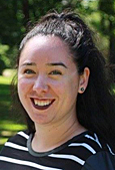 Tēnā koutou katoa. Ko Kāi Tahu me Te Rarawa ōku iwi. Ko Tāwini White tōku ingoa. I grew up in Whāngārei, Christchurch and a small rural town called Rāwene, NZ. I attended kōhanga reo in Whāngārei, primary school in Christchurch and high school in Kaikohe. I currently live in Dunedin, NZ after completing my Master of Arts in Māori Studies at the University of Otago in May. My research focused on Māori tribal and regional languages. I am now a tutor for the Māori language, culture and society at the University of Otago. I have a passion for the revitalisation of the Māori language and culture, more specifically tribal dialects. I am excited for this opportunity.
Tēnā koutou katoa. Ko Kāi Tahu me Te Rarawa ōku iwi. Ko Tāwini White tōku ingoa. I grew up in Whāngārei, Christchurch and a small rural town called Rāwene, NZ. I attended kōhanga reo in Whāngārei, primary school in Christchurch and high school in Kaikohe. I currently live in Dunedin, NZ after completing my Master of Arts in Māori Studies at the University of Otago in May. My research focused on Māori tribal and regional languages. I am now a tutor for the Māori language, culture and society at the University of Otago. I have a passion for the revitalisation of the Māori language and culture, more specifically tribal dialects. I am excited for this opportunity.



